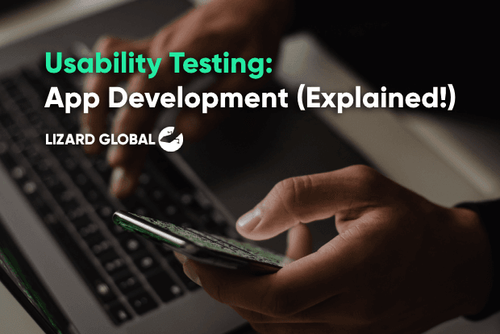What Is AI Consultancy? Should We Explore Now?
Get the latest updates about our blog posts.
Subscribe so you don’t miss out!
Follow Lizard Global on Facebook, Instagram, and LinkedIn.
At times when data reigns supreme and technological advancements reshape industries, the integration of Artificial Intelligence (AI) has become one of the most contributing forces for businesses striving to stay competitive. AI consultancy emerges as a guiding light, offering organizations the expertise needed to navigate the complex landscape of AI adoption and implementation.
AI integration is crucial for modern businesses, offering a plethora of benefits that drive efficiency, improve decision-making, and provide a competitive edge. This includes operational efficiency, reduces costs, and optimizes resource allocation. But, before we explore the impact of AI integration and the importance of AI consultancy, let’s first understand what AI consulting is.
🧠 What is AI Consultancy?
At its core, AI consultancy is a specialized form of advisory services that focuses on leveraging the power of artificial intelligence to drive business transformation. AI consultants are seasoned experts who bring a deep understanding of both the intricacies of AI technologies and the unique challenges faced by different industries. Their primary objective is to assist organizations in harnessing the full potential of AI to enhance efficiency, optimize processes, and achieve strategic objectives.
The role of AI consultants typically involves assessing the specific needs and challenges of a business, developing a tailored AI strategy, selecting appropriate technologies, overseeing implementation, and providing ongoing support for the integration of AI solutions. AI consultants may work independently or as part of consulting firms that specialize in technology and digital transformation.
Though the qualifications of AI consultants vary, they often have a strong background in computer science, data science, or a related field. They often time stay updated on the latest developments in AI and possess a deep understanding of how AI can be applied across various industries.
🤖How AI Consultancy Differs from Traditional Consulting
AI consultancy and technical consultancy share similarities, as both involve providing specialized advice to businesses, but they differ in their focus and expertise.
AI Consultancy
Specific Focus on AI Technologies: AI consultants specialize in artificial intelligence technologies, such as machine learning, natural language processing, and data analytics. Their expertise revolves around leveraging AI to address business challenges, improve processes, and drive innovation.
Data-Driven Decision-Making: AI consultants often emphasize data-driven decision-making and help organizations harness the power of data through AI applications. They may work on projects related to predictive analytics, pattern recognition, and automated decision support systems.
Industry-Specific Solutions: AI consultants tailor their recommendations to specific industries, understanding the unique challenges and opportunities each sector presents. They provide insights on how AI can be applied in a targeted manner to meet industry-specific needs.
Technical Consultant
Broader Technical Expertise: Technical consultants have a broader focus on various technical aspects of IT and business operations. While they may be knowledgeable about AI, their expertise extends to other areas such as software development, system architecture, network infrastructure, and cybersecurity.
General Technology Integration: Technical consultants often deal with the integration of various technologies within an organization. This could include implementing new software, optimizing hardware infrastructure, or ensuring the overall technology stack aligns with business objectives.
Cross-Functional Roles: Technical consultants may work on projects that involve a wide range of technical components beyond AI. They may be involved in areas like ERP (Enterprise Resource Planning) systems, cloud computing, cybersecurity, and IT strategy.
Do you think your business is not yet ready for AI implementation? Well, ask a technical consultant in this blog to fully understand why you should hire a technical consultant.
🦾 Benefits of AI Consultancy
AI consultancy is not something you should overlook. It emerges as one of the leading catalyst for organizational transformation, offering tons of benefits that have the potential push to businesses to achieve heightened efficiency and strategic decision-making. Some of the benefits include:
1. Improving Business Processes and Efficiency
AI consultants meticulously analyze existing business processes, identifying inefficiencies and bottlenecks. By integrating tailored AI solutions, these consultants optimize workflows, streamline operations, and significantly enhance overall efficiency. Whether automating routine tasks or improving communication channels, the result is a leaner, more agile organizational structure.
For instance, in a manufacturing setting, AI can scrutinize production workflows, identifying areas of slowdown or excess resource utilization. Through data-driven insights — derived from diverse sources such as customer interactions, transaction records, website analytics, social media engagement, and sensor data from IoT devices — consultants can recommend strategic adjustments, such as predictive maintenance schedules, such as analyzing equipment performance data to predict potential failures and recommending proactive maintenance schedules, or dynamic resource allocation through real-time data to optimize resource distribution, to ultimately enhance efficiency and streamline operations.
2. Enhancing Decision-Making through Data Analysis
Through AI, consultants help organizations make informed decisions grounded in robust data analysis. AI algorithms sift through vast datasets, extracting meaningful insights and patterns that might elude traditional analytical approaches. Unlike traditional analytical approaches, AI algorithms can autonomously identify complex patterns and relationships within the data, even when those patterns are non-linear or subtle. Through iterative learning, these algorithms adapt and optimize their models to extract meaningful insights, providing a more nuanced understanding of the data and uncovering hidden patterns that might elude traditional analytical methods.
The precision and depth of analysis enhance the accuracy of decision-making, allowing organizations to respond proactively to market trends, customer behaviors, and operational dynamics. This, in turn, fosters a more strategic approach, ultimately improving the overall effectiveness and success of business decisions. This data-driven decision-making not only accelerates the pace of strategic choices but also ensures a more accurate and nuanced understanding of business dynamics.
3. Streamlining Operations with Automation
Automation lies at the heart of AI consultancy, enabling the seamless execution of repetitive tasks and processes. Through the deployment of AI-driven automation, consultants help businesses reduce manual labor, minimize errors, and increase operational speed.
AI consultants implement automation by identifying repetitive tasks in business processes. They design and deploy AI-driven solutions, such as robotic process automation (RPA), to handle these tasks efficiently. Through machine learning, these systems adapt and learn from data, minimizing errors over time. This reduces the need for manual intervention, cutting operational costs and accelerating processes, such as faster execution, continuous operation, real-time decision-making, and parallel processing.
This not only cuts costs but also allows human resources to focus on more complex and value-added activities, fostering a workforce that thrives on creativity and innovation.
⚙️ How to Build the Ultimate AI Strategy Development Strategy
Crafting a successful AI strategy is the pillar for organizations that are seeking to integrate AI into the business. This strategic blueprint involves three steps, which are; creating a roadmap that intricately weaves AI into the fabric of business operations while aligning seamlessly with overarching goals.
1. Creating a Roadmap for AI Integration
A well-defined roadmap is the cornerstone of successful AI integration. As mentioned previously, AI consultants meticulously assess the organization's current state, identifying opportunities and challenges. The AI integration roadmap ensures success by:
Comprehensive Assessment: Conducting a thorough analysis of current processes, systems, and data to identify specific areas where AI can add value.
- Clear Objectives and Milestones: Defining clear and measurable objectives for AI integration, aligning them with overall business goals.
- Prioritized Use Cases: Ensuring that the selected use cases align with strategic priorities and have a demonstrable return on investment.
- Phased Implementation: Prioritizing quick wins in the early stages to build momentum and showcase tangible benefits to stakeholders.
- Technology Selection and Integration: Selecting AI technologies that align with the organization's goals and existing infrastructure.
- Data Governance and Security: Implementing measures to comply with regulatory requirements and building trust among stakeholders.
- Continuous Monitoring and Optimization: Iteratively optimizing the AI strategy based on feedback, changing business needs, and advancements in technology.
2. Aligning AI Strategy with Business Goals
The effectiveness of an AI strategy lies in its alignment with the broader business objectives. AI consultants collaborate closely with key stakeholders to understand organizational goals, challenges, and opportunities. Consultants ensure that every AI initiative contributes directly to the organization's success. Whether enhancing customer experiences, optimizing operational efficiency, or driving innovation, the AI strategy becomes a catalyst for achieving strategic milestones.
3. Long-term vs. Short-term AI Implementation Plans
AI consultants assess whether a long-term or short-term approach is more suitable based on the business's goals, resources, and industry dynamics. Short-term plans may focus on quick wins, delivering immediate impact, while long-term plans involve a more extensive and transformative integration that sets the stage for sustained growth. Striking the right balance ensures that AI initiatives align with the organization's pace and capacity for change, with consideration of:
Organizational Objectives: When aligning AI goals with organizational objectives, short-term goals are aptly suited for organizations seeking immediate impact. This may involve achieving quick wins, optimizing operational efficiency promptly, or responding rapidly to dynamic market changes. In contrast, long-term goals become imperative when the focus shifts toward transformative changes, the establishment of sustained competitive advantages, or fundamental shifts in business models.
Resource Availability: Short-term goals are often pursued when the organization aims to achieve tangible results with existing capabilities and under resource constraints. On the other hand, long-term goals involve an extensive implementation approach, necessitating sufficient resources to fuel transformative AI initiatives.
Stakeholder Expectations: Short-term goals cater to stakeholders expecting immediate returns on investment, showcasing tangible benefits promptly. In contrast, long-term goals require a patient approach, with stakeholders understanding and supporting longer timelines for transformative outcomes.
Competitive Landscape: Short-term goals are strategically advantageous in dynamic markets, allowing organizations to secure quick wins for a competitive edge. In stable markets, long-term goals come to the forefront, emphasizing sustained innovation and differentiation as key factors for enduring success.
🤝 Selecting the Right AI Consultancy Partner
Choosing the right AI consultancy partner is a critical decision that business owners need to make as it significantly impacts the success of AI integration within an organization. To ensure a seamless and fruitful collaboration, it is essential to adhere to specific criteria and ask pertinent questions during the selection process.
Criteria for Choosing an AI Consultancy Firm
Expertise and Specialization: Assess the consultancy's expertise in AI technologies, machine learning, and relevant domains. Confirm specialization in industry-specific applications to ensure tailored solutions.
Proven Track Record: Evaluate the consultancy's track record through case studies and client testimonials. Verify successful AI implementations and tangible outcomes achieved for previous clients.
Understanding of Business Needs: Ensure the consultancy thoroughly understands the unique challenges and goals of the organization. Look for a partner that aligns AI strategies with specific business objectives.
Innovative Approach: Assess the consultancy's commitment to staying updated with the latest AI trends and innovations. Seek a partner capable of offering cutting-edge solutions for maximum impact.
Collaborative and Transparent Communication: Prioritize consultancies that foster open communication and collaboration. Confirm transparent reporting mechanisms to keep stakeholders informed throughout the process.
Questions to Ask When Selecting an AI Consultant
Can you provide examples of successful AI implementations in a similar industry? This helps gauge the consultant's experience and effectiveness within specific business contexts.
How do you approach data privacy and security in AI implementations? Ensuring the consultant follows ethical guidelines and prioritizes data protection is critical.
What is your strategy for knowledge transfer to in-house teams? Assess the consultant's commitment to empowering internal teams with AI knowledge for sustainable operations.
How do you tailor AI solutions to address our organization's unique challenges? Understanding how the consultant customizes solutions ensures relevance to specific business needs.
What is the anticipated timeline for implementing AI solutions? Having a clear timeline helps manage expectations and aligns the integration with organizational goals.
How do you handle scalability as our organization grows? Ensuring that the AI solutions are scalable and adaptable to future organizational changes is crucial.
🤔 Should Businesses Explore AI Consultancy in 2024?
Absolutely, businesses should explore AI consultancy in 2024. As AI continues to evolve rapidly, leveraging the expertise of AI consultants becomes crucial for organizations aiming to stay competitive. AI consultancy can unlock transformative opportunities, enhance efficiency, and provide strategic guidance in navigating the dynamic landscape of emerging technologies. Investing in AI consultancy allows businesses to harness the full potential of AI, enabling innovation, data-driven decision-making, and sustainable growth in the rapidly evolving business environment.
👀 How Much does It Cost to Build an App in 2024?
We get it, pricing can be a puzzler. But fear not, let's crunch numbers together! Our App Cost Estimator tool is here to sprinkle a bit of magic on your budgeting journey. It's as easy as picking your features and voilà—your app investment is laid out in front of you. Click, calculate, and get ready for the appventure of a lifetime.
Want to find out how much it costs to build your dream app or web app?




